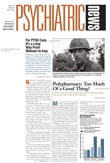For years, psychiatry residency programs have been “behind the times” in teaching residents how to conduct a variety of evidence-based psychotherapies, according to Priyanthy Weerasekera, M.D., M.Ed., an assistant professor of psychiatry and behavioural neurosciences and coordinator of the postgraduate psychotherapy training program at McMaster University in Ontario, Canada.
Weerasekera spoke about the importance of psychotherapy training for residents at the seminar “Scholarly Activity in Psychotherapy Training,” held in conjunction with the annual meeting of the American Association of Directors of Psychiatric Residency Training in New Orleans in March (
see story above).
“Until the last couple of years, residency training guidelines were not based on what the evidence was telling us,” she noted. Many psychiatrists, including herself, were trained to conduct just one type of psychotherapy, such as psychodynamic psychotherapy.
In January 2001, the Residency Review Committee in Psychiatry (RRC) of the Accreditation Council for Graduate Medical Education began requiring residents to demonstrate competency in brief psychotherapy, cognitive-behavioral therapy, combined psychotherapy and psychopharmacology, psychodynamic therapy, and supportive psychotherapy.
But some Canadian residents were already ahead of the game. In 1995, six years before the RRC issued those requirements in the United States, Weerasekera developed McMaster’s postgraduate psychotherapy training program “to instill in residents the skills they need to make the best treatment decisions for their patients” by enabling them to conduct different types of evidence-based psychotherapies with a variety of patients.
The program includes seven mandatory psychotherapy modules, which residents complete by the end of the four-year program: client centered, cognitive-behavioral therapy (CBT) for depression, CBT for anxiety, interpersonal therapy for depression, long-term dynamic psychotherapy for interpersonal problems, couples and family therapy, and group therapy.
Residents also learn the importance of establishing a therapeutic alliance with patients, regardless of what type of therapy they are conducting, and how to integrate pharmacotherapy with psychotherapy, Weerasekera said. Many of the specific therapeutic skills are taught by manuals, which “operationalize treatment and enhance patient outcomes,” she added.
As they learn the skills necessary to conduct the different psychotherapies, residents “are assessed in a standardized, objective manner,” she noted. For instance, most of the residents’ individual therapy sessions are audiotaped, and family and couples therapy is videotaped.
The tapes are then reviewed by a faculty member, who uses a rating scale to evaluate the resident’s performance and gauge the level and quality of the patient’s improvement between the first and last few sessions of psychotherapy, Weerasekera said.
In their fourth year of training, residents learn what Weerasekera calls the “multiperspective formulation model,” which teaches residents how to integrate the different types of psychotherapy they’ve learned and perhaps use several different approaches with one particular patient.
“For me,” Weerasekera said, “the most rewarding thing has been to see that residents can learn these interventions and offer them to patients as part of their treatment.”
Information about McMaster University’s postgraduate psychotherapy training program is posted online at www.fhs.mcmaster.ca. ▪

